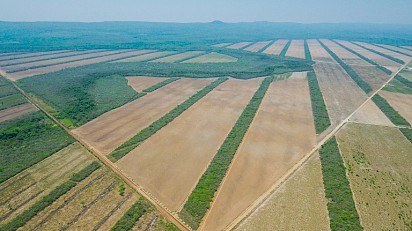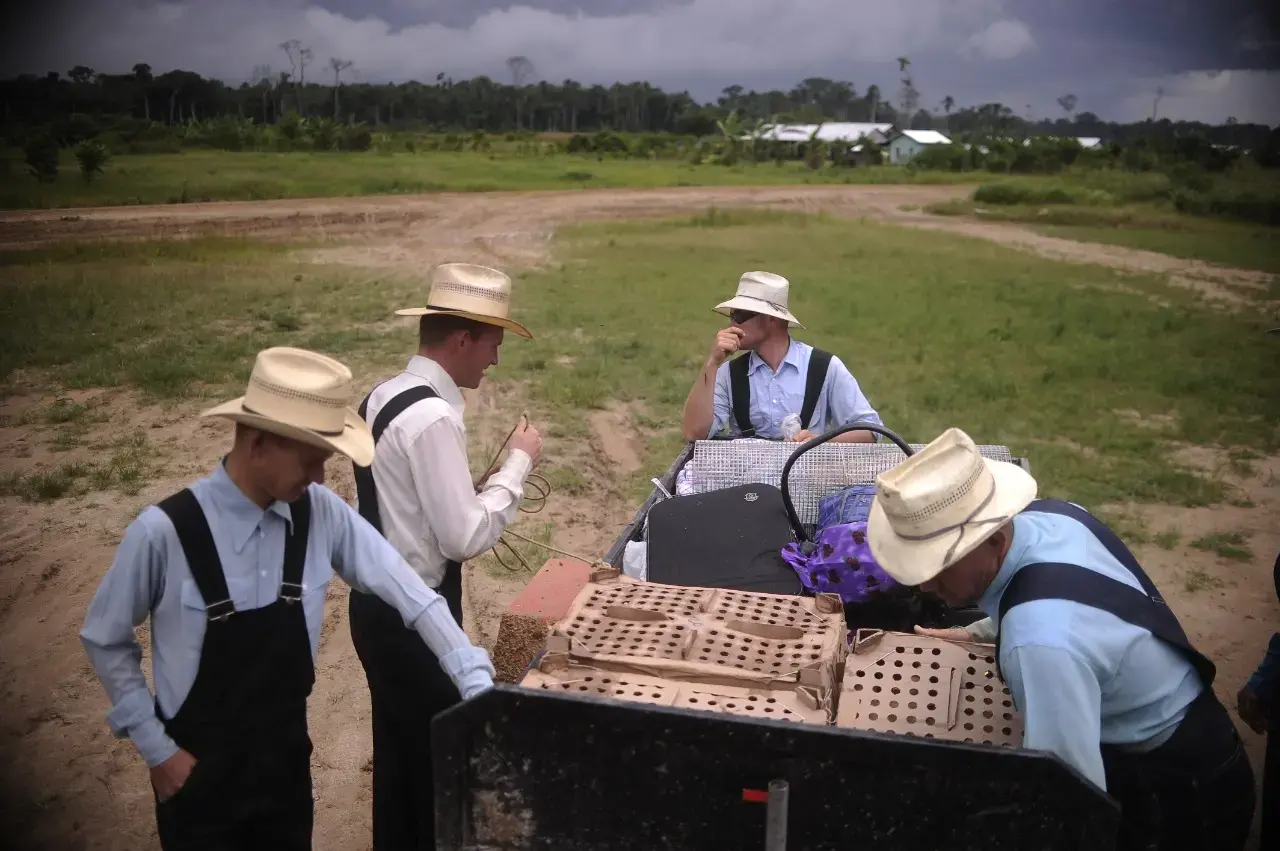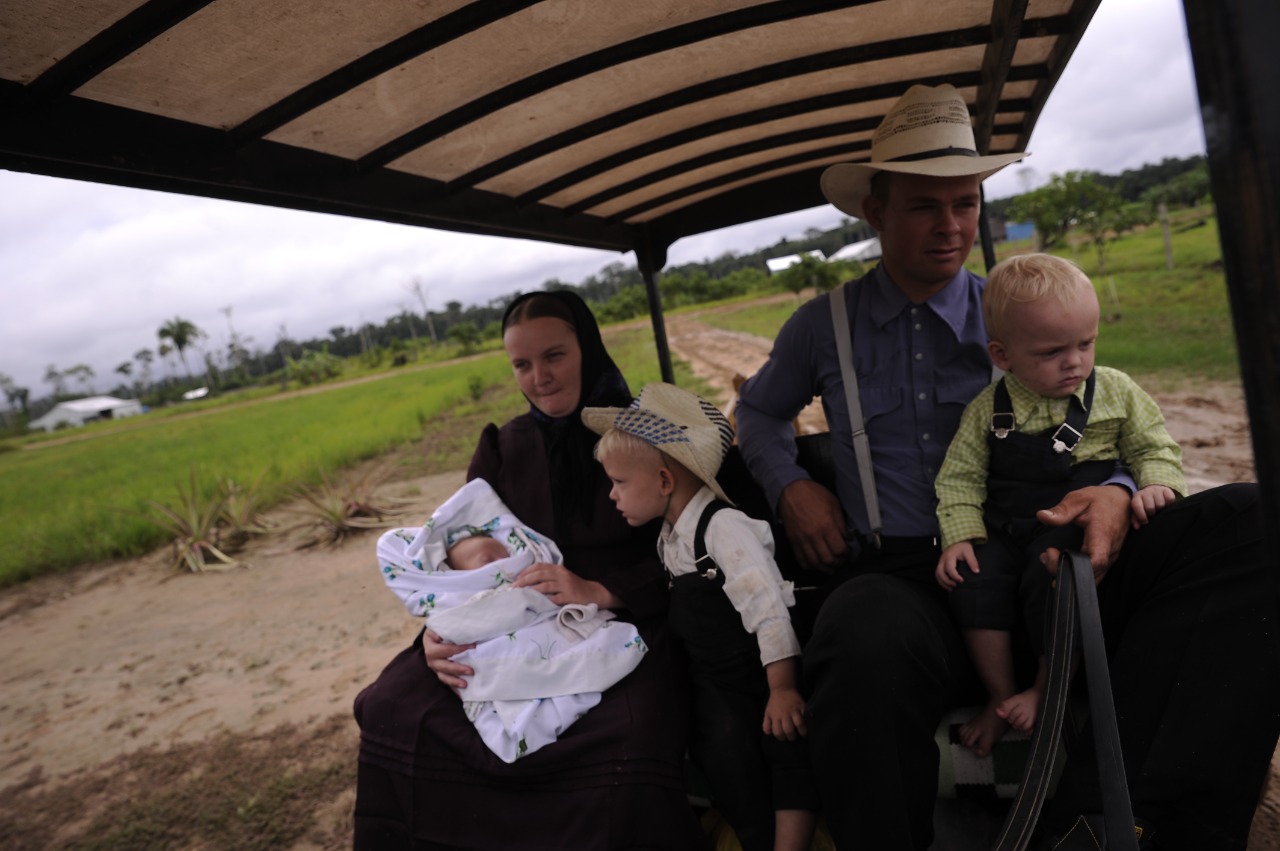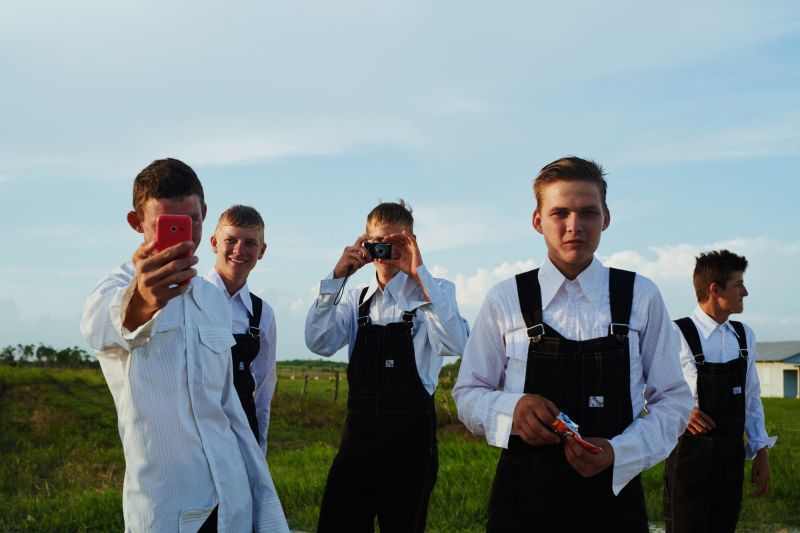Latin America
Related: About this forumSuriname cancels controversial Mennonite pilot program, but bigger problems loom
by Maxwell Radwin on 20 March 2024

The government in Suriname said it cancelled a controversial pilot program that would have brought hundreds of Mennonites to the country to carry out agricultural activity, likely in forested areas.
Suriname President Chan Santokhi confirmed to local media this week that he shuttered a pilot program setting aside 30,000 hectares (74,131 acres) for 50 Mennonite families, easing some fears that the country was on the verge of destroying large parts of the Amazon Rainforest.
“We in the international conservation movement congratulate President Santokhi and the people of Suriname for taking a thoughtful and considered move in deciding how best to manage the country’s resources for the benefit of all the country’s citizens,” said President of Amazon Conservation Team Mark Plotkin.

More:
https://news.mongabay.com/2024/03/suriname-cancels-controversial-mennonite-pilot-program-but-bigger-problems-loom/
Judi Lynn
(160,598 posts)by Robin Canul, VALERIA CONTRERAS on 15 March 2023 | Translated by Matthew Rose

BACALAR, Mexico — Less than a decade ago the El Bajío ejido — a form of communal land in Mexico —consisted primarily of rainforest. Today, the landscape is vastly different, with vast open fields of soybeans, sorghum and corn. This transformation was brought about by the mechanized agricultural activities of Mennonite families who began settling in the southern part of the Mexican state of Quintana Roo in the early 2000s.
“In the past, we could enter on horseback, but since they [the Mennonites] came, they have made many roads for us,” said Rigoberto, an ejidatario — or communal landowner — in his eighties who has witnessed the transformation of the land.

Mennonite colonies only began to establish themselves in the municipality of Bacalar a little over two decades ago. Image by Robin Canul.
The mechanized agricultural practices employed by the Mennonites, a religious group of European origin known for their extensive monoculture plantations and demand for permanent land rights, have faced opposition from some of the region’s residents, who say they are flouting environmental regulations.
“They cut down thousands of hectares … there is a lot of illegal logging with them,” said one member of Kabi Habin, a cooperative of Quintana Roo beekeepers. The member, who requested anonymity for safety reasons, said large-scale agriculture has spread from what is now known as the Salamanca ejido – the first place where the Mennonites arrived back in 2001 – to other parts of the municipality.
More:
https://news.mongabay.com/2023/03/deforestation-on-the-rise-in-southern-mexico-as-mennonite-communities-move-in/
Judi Lynn
(160,598 posts)
The Maya Forest Corridor is a 2.5 mile-wide stretch of forest, wetlands and savanna that connects the jungles of southern Belize with forests in the north and in Guatemala and Mexico. Together, this Selva Maya is the largest tropical forest north of the Amazon. Credit: Kevin Quischan
Conservationists are racing to save what’s left of the largest tropical forest in Central America, as commercial farming and population growth threaten to cleave it in two.
By Nicholas Kusnetz
March 10, 2024
GALLON JUG, Belize — Deep in a jungle in northern Belize, Elma Kay stood at the base of a rare, ancient mahogany tree, perhaps the only one for miles around. On the trunk above her head were healed gashes where loggers had erected a platform decades ago in an aborted attempt to fell the giant hardwood, prized for its richly hued lumber.
The Big Tree, as Kay calls it, is a relic. Centuries of extraction removed nearly all the old-growth mahoganies from northern Belize, first under British colonial rule and then commercial logging.
“This is a testament that this forest can support trees like this,” said Kay, a leading Belizean conservationist, her hand resting on the tree’s trunk, more than eight feet across. She was wearing a white, long-sleeved utility shirt to deter biting insects, despite richly humid heat, and carried binoculars around her neck.
Kay spent her childhood outdoors, looking for snake eggs and swimming in the lagoon next to her village. But it was a week spent in the jungle only about 20 miles from the Big Tree, in what was then a newly-created forest reserve, that hooked her on conservation. Kay was 16 when she won a scholarship to join a trip organized by a group called Save the Rainforest, which brought teachers from North America to the jungle. It was the first time she realized that conservation biology could be a career. Almost 30 years later her work brought her back to the same jungle.
In 2021, the forest surrounding the Big Tree was for sale and the most likely buyers were Mennonite farmers prepared to clear the jungle. The owner, an American logging firm, had extracted only select trees while leaving the rest of the forest largely intact. It had already sold smaller parcels, and those had been quickly cleared for row crops or pasture. If this much larger patch were cleared, too, it would eliminate a crucial connection between Belize’s jungle and the rest of the Selva Maya, which stretches into Guatemala and Mexico and forms the largest tropical forest in the western hemisphere outside the Amazon.
More:
https://insideclimatenews.org/news/10032024/belize-tropical-rainforest-deforestation-carbon-offsets/
They should ban the practice by US American "green" lumber companies of doing "selective" harvesting of trees then selling them to groups who convert the land to farmland, destroying every tree left standing by the lumber companies. )
Judi Lynn
(160,598 posts)February 22, 2023

Mennonites, often searching for new land to expand their simple, rural lifestyles, have founded hundreds of communities across Latin America over the last century. In forested areas, particularly the Amazon, that’s become a problem when the communities clear trees to make room for agriculture — sometimes thousands of acres at a time.
Bolivia has felt the brunt of the impact in recent years. Mennonite soy farms have been a main driver of deforestation in the Beni and Santa Cruz departments, where vulnerable areas like the dry forest biome of Chiquitanía are already suffering from drought and fires caused by climate change.
“What’s happened over the last thirty years is a consolidation of the Mennonites, which is also transforming the forest,” said Daniel Larrea, science and technology program coordinator with Conservación Amazonica in Bolivia.
Recently released satellite data shows that soy plantations were responsible for over 900,000 hectares (2.2 million acres) of deforestation between 2001 and 2021, or a land mass roughly the size of Vermont, according to two new reports from NGO Amazon Conservation. Mennonites were responsible for around a quarter of it, or 210,980 hectares (521,344 acres), with activity increasing in the last five years.
More:
https://kleanindustries.com/resources/market-analysis-researcph/bolivia-has-a-soy-deforestation-problem-its-worse-than-previously-thought/
(In the last five years, Bolivia citizens (enormous native population) were compelled to see their government suffer a Trump-backed coup by racist christo-fascists European-descended right-wingers, then attempt to regain footing with an actually elected indigenous president who has bowed to pressure from the fascists.)
Judi Lynn
(160,598 posts)
Medium_dji_0972-1200x800-1
Deforestation in the Pindo’i Indigenous Territory. Image by Mario Silvero.
Mongabay 24 March 2023
Mennonite colonies linked to deforestation of Indigenous territories and protected areas in Paraguay
by Aldo Benítez | Translated by Maria Angeles Salazar
ASUNCIÓN, Paraguay — In the middle of the Paraguayan portion of the Upper Parana Atlantic Forest, a paved road leads to the Mbya Indigenous community of Pindo’i.
Roads in the area are usually unpaved and uneven, and in the rainy season it’s almost impossible to use them due to mud. But this road is different.
A sign posted over where the road begins reads “Sommerfeld Colony — Welcome — Private land and roads.” It’s a Mennonite colony whose families use the road to move cattle, soy, corn or wheat they grow in their cropland that surrounds the Indigenous community.
Satellite data and imagery from Global Forest Watch show clearing associated with large agricultural fields whittling away at already-fragmented tracts of primary forest in the Pindo’I Indigenous Territory over the past several years.
More:
https://www.farmlandgrab.org/post/31464-mennonite-colonies-linked-to-deforestation-of-indigenous-territories-and-protected-areas-in-paraguay
Response to Judi Lynn (Original post)
Judi Lynn This message was self-deleted by its author.
Judi Lynn
(160,598 posts)This article is more than 1 year old
Dan Collyns in Wanderland
Sat 10 Sep 2022 19.00 EDT
A brush with the law has alarmed the community of about 100 families who fear losing the land they have made their home
Were it not for the ebullient fecundity of the Amazon rainforest surrounding it, Wanderland could almost be a stretch of Dutch farmland from the 19th century; a straight muddy track bisects rows of neatly spaced farmyards with perpendicular houses and barns.
A typical morning begins as horse-drawn buggies driven by smiling blond-haired, blue-eyed boys collect shiny churns of fresh milk from farm gates to be made into cheese. The name given to this pastoral idyll carved out of thick foliage of the jungle seems to need little translation, even from Plautdietsch, the mixture of Low German and Dutch spoken by its inhabitants.
But there is unease in this rustic paradise. It is one of three Mennonite communities being investigated by Peruvian prosecutors over accusations of illegally deforesting more than 3,440 hectares (34 sq km) of tropical rainforest in the past five years. The brush with the law has alarmed the community of about 100 families who fear they could lose the land which they have made their home.
Abraham Thiesen, 44, who arrived to Peru with his wife and six children in 2015, is among several hundred of the secretive Anabaptist Christian group which traces its origins to 16th-century Friesland who migrated from Bolivia, along with others from Belize, where they have long-established populations.
Thiesen, president of the Wanderland Mennonite association, says they acquired the land in good faith for agricultural purposes on the understanding that they would be granted legal titles once the area was cleared for farming.
. . .
But these Old Order Mennonites, the most orthodox of the pacifist sect, which has spread from Canada to India in their search for isolation and grand expanses of land to farm, may have fallen afoul of the notorious informality and corruption often linked to land-titling in the Peruvian Amazon.
;
More:
https://www.theguardian.com/world/2022/sep/11/mennonites-peru-deforestation-permits
(In time, watching Peruvian news, you'll realize why Peru has had such a wildly corrupt, powerful, racist legislature so long. )






Easterncedar
(2,313 posts)Response to Judi Lynn (Original post)
Judi Lynn This message was self-deleted by its author.
hlthe2b
(102,335 posts)Granted more of my attention is directed elsewhere in the world than that part of South America in recent years, but an important issue. What is the origin of most of these Mennonites there and elsewhere in South America? May put a new wrinkle on the problems of "immigration."